Principle 1: Businesses should conduct and govern themselves with ethics, transparency and accountability
The Board of Directors and senior management of GCPL comply with the following code of conduct:
- Demonstrate the highest standards of integrity, business ethics, and corporate governance.
- Perform their roles with competence, diligence, in good faith and in the best interests of the Company.
- Provide expertise and experience in their areas of specialisation and share learnings at Board meetings with the best interests of the Company and its stakeholders in mind. They should point the Company’s management in the right direction based on their experience and judgement.
- Give careful and independent consideration to the affairs of the Company and all documents placed before them to satisfy themselves with the soundness of key decisions taken by the Management. They should call for additional information, where necessary, for making such judgements.
- Not engage in any business, relationship or activity which detrimentally conflicts with the interest of the Company/Godrej Group or bring discredit to it. Any situation that creates a conflict of interest between personal interests and the Company and its stakeholders’ interests must be avoided at all costs.
- Follow all the guidelines put forth in the Insider Trading Code of Conduct.
- Not disclose any confidential/privileged information of the Company and should direct any media queries or approaches to the appropriate spokesperson within the Company.
Applicability of the Code of Conduct:
This Code of Conduct (Code) applies to Directors of GCPL. It also applies to the senior management of the Company, i.e. one level below the executive directors, and all functional heads. An annual confirmation affirming compliance with the Code of Conduct is obtained from Board Members and senior management every year and the same has been obtained for the year ended March 31, 2015.
Does the policy relating to ethics, bribery and corruption cover only the Company? Yes /No. Does it extend to the Group/joint ventures/suppliers/contractors/NGOs/others?
The Company has a Code of Conduct, which is applicable to all individuals working in the Company. For the subsidiaries and joint ventures, the Code is applicable in line with the local requirements prevailing in the country of operation. The Company encourages its business partners to follow the code.
How many stakeholder complaints received in the past financial year and what percentage was satisfactorily resolved by the Management?
There were 2 complaints outstanding at the beginning of the year and 104 complaints were received during the year. All the complaints were resolved during the year.
Principle 2: Businesses should provide goods and services that are safe and contribute to sustainability throughout their life cycle
Godrej Group’s Good & Green vision supports the development of products that are environmentally sustainable. As part of the vision, the Company aspires to develop products that consumes fewer energy resource (energy, water), emit fewer greenhouse gases and include 100% of recyclable, renewable, and/or natural materials.
Good & Green, a group-wide initiative, focuses on building a more inclusive and greener India by 2020. This targets achieving zero waste to landfill, carbon neutrality, positive water balance and the use of renewable energy for at least 30% of our energy requirements. Another objective of this initiative is to target achieving a third of our revenues being generated from environmentally friendly products and services.
List up to three of your products or services whose design has incorporated social or environmental concerns, risks and/or opportunities.
For each such product, provide the following details in respect of resource use (energy, water, raw material, etc.) per unit of product (optional).
- The commercialisation to the gel technology for aer with both the ‘Twist and Click Formats’ is a notable example of a fine innovation in market place, whilst providing a strong differentiated offering to our consumers in air freshening space.
The above innovation, besides providing superior value and delight to our consumers, was maintained optimal on costs with a view to sustain business profitability.
- The current year also witnessed more launches in Household Insecticide category with new product innovation and for the first time entering into a new format such as Good knight Fast Card, a low cost format to drive innovation and product performance.
- Refill category has experienced yet another launch with Good knight Xpress, a latest improvement in technology for powerful and quicker mosquito control. This provides a better upgradation of consumer benefits with quicker and powerful mosquito control, using latest technology in device and wick.
We have maintained a strong focus on sustainable development by meeting environmental parameters in site selection and planning, water efficiency, energy efficiency, material and indoor environmental quality.
Does the Company have procedures in place for sustainable sourcing (including transportation) and percentage of inputs sourced sustainably?
In India, our demand driven supply chain has led to mutually beneficial relationships with our suppliers and dealers. We have extended this to include partnerships with key Modern Trade players.
GCPL has established an automated sourcing system that covers all consumer products globally and utilises practices such as the Theory of Constraints, Demand Driven Supply Chain, Total Productive Maintenance and Six Sigma. This initiative is designed to lower costs by reducing purchase and freight costs and wastage and improving manufacturing yields.
GCPL has always laid emphasis on procuring raw materials in a responsible manner. There has been an increasing trend in the amount of sustainably sourced palm oil which is used in place of crude oil derived products.
GCPL has also initiated supply chain sustainability. In order to extend our Good & Green commitment to our vendors and to encourage them to contribute towards supply chain sustainability, a booklet will be circulated to our vendors. A draft policy on sustainable procurement has been developed and is under review to be finalised.
Has the Company taken steps to procure goods and services from local and small producers including communities surrounding their place of work?
If yes, what steps have been taken to improve their capacity and capability of local and small vendors?
Yes. All agri based bulk materials, shippers and plastic components are produced locally, closer to the plants. These vendors are given priority payments and also technology and quality systems upgradation supports.
Does the Company have a mechanism to recycle products and waste? If yes, what is the percentage of recycling of products and waste? (Separately as less than 5%, 5-10%, >10%)
Most of the waste like wrappers, stiffeners and packaging materials like bottles and corrugated boxes are disposed to the vendors who recycle it. Spent lubricating oil is also disposed to recyclers, majority of waste soap is recycled by the Company, and balance is disposed to small scale manufacturers. All of our major units are certified by environment management system as per ISO 14001.
Principle 3: Businesses should promote the well being of all employees
GCPL focuses on ensuring the well being of all its employees. The safety and health of employees is extremely important to the Company and GCPL is committed to building and maintaining a safe and healthy workplace. Ensuring diversity, zero discrimination, safety, health and other attributes essential to a healthy and good working environment are part of our Code of Conduct. All employees who join GCPL demonstrate their commitment to follow the code of ethics by signing in their acceptance to adhere to the same. Examples of a few of the principles of this code of conduct are listed below.
Diversity, anti-discrimination and equal opportunities: We value diversity within the Godrej Group and are committed to offering equal opportunities in employment. We will not discriminate against any team member or applicant for employment on the basis of nationality, race, colour, religion, caste, gender, gender identity/ expression, sexual orientation, disability, age, or marital status. GCPL also subscribes to the CII-ASSOCHAM Code of Conduct for Affirmative Action.
Progressive Human Resource policies: GCPL prides itself as a great place to work, a fact recognised and acknowledged externally as well. This is evident in GCPL’s consistent ranking as the best FMCG Company to work for in the “Great Place to Work Study 2014” as well as its featuring among the top 25 best employers in Asia, as per the Aon Hewitt Best Employers 2014 study. HR policies like flexible work hours, work from home arrangements, part-time work, adoption leave and benefits, extended maternity leave and benefits, paternity leave and benefits – to name a few – go a long way in ensuring that the employees successfully strike a work-life balance. We are committed to the health and well being of our employees and have an onsite medical centre, hospital and children’s day care facility within the Godrej Vikhroli campus.
On-campus facilities (Vikhroli, Head Office): We have a canteen facility in the campus where refreshments are provided. Transport facility is provided from the office to the nearest railway station and the Godrej Housing Colony. The Head Office premises has a Bank ATM and a travel helpdesk. Health and fitness initiatives include morning yoga sessions, a full-time fitness instructor and nutritionist. All GCPL sites are non-smoking zones. Smoking is strictly prohibited in the campus.
Prevention of sexual harassment: The Company is committed to creating and maintaining an atmosphere in which our team members can work together, without fear of sexual harassment, exploitation or intimidation. The Company has ensured compliance with the Sexual Harassment of Women at Workplace (Prevention, Prohibition and Redressal) Act, 2013. We have constituted an Internal Complaints Committee in accordance with the act and updated the group’s policy to ensure that women are protected against sexual harassment at the workplace. Every team member is made aware that the Godrej Group is strongly opposed to sexual harassment and that such behaviour is prohibited both by law and the Group policy. The Company takes all necessary action(s) required to prevent and correct behaviour which violates this policy.
Engagement forums: There are multiple touch points for leadership team to interact with employees through forums like the long range plan, annual operating plan cascades and updates, open houses, town halls, focus groups around engagement surveys, HR connect sessions, skip level meetings by senior leadership, etc. GCPL practices ‘Bedhadak Bolo’ as a philosophy which salutes the spirit of expression and innovation at Godrej. This encourages people to ‘Bedhadak Bolo’ – to speak and express openly and fearlessly. ‘Bedhadak Bolo’ has resulted in employees coming forward and speaking translating into numerous changes and innovations within the organisation. It has also resulted in better team dynamics and an incredibly more open work environment.
The Company provides continuous skill upgradation and learning opportunities through structured career discussions and individual development plans. The organisation invests in functional training for all employees in line with their current and future career aspirations.
The learning suite encompasses functional training, leadership development programmes and behavioural training geared towards leading self, leading others and leading business.
Please indicate the total number of employees
Total permanent employees: 2,239
Male: 2,089
Female: 150
Total contract employees: 5209
Employees with disabilities: 13
Does the Company have an employee association that is recognised by management?
Yes
What percentage of permanent employees are members of the recognised employee association?
Approximately 40%
Please indicate the number of complaints relating to child labour, forced labour, involuntary labour, sexual harassment in the last financial year and pending, as on the end of the financial year.
Nil
What percentage of your under mentioned employees were given safety & skill upgradation training in the last year?
|
Sl. No.
|
Category
|
Safety
|
Skill upgradation
|
|
1.
|
Permanent Male Employees
|
87.8%
|
83.42%
|
|
2.
|
Permanent Female Employees
|
100%
|
100%
|
|
3.
|
Employees with Disabilities
|
100%
|
100%
|
|
4.
|
Casual/ Temporary/ Contractual Employees
|
100%
|
100%
|
Principle 4: Businesses should respect the interests of, and be responsive towards all stakeholders, especially those who are disadvantaged, vulnerable and marginalised
We have already identified and prioritised key stakeholders and we continue our engagement with them through various mechanisms such as consultations with local communities, supplier/vendor meets, customer/employee satisfaction surveys, investor forums, etc. Each year we review the stakeholder universe and add a few more groups. The feedback obtained during our interactions help us in prioritising the report content and its completeness.
The stakeholder engagement process consists of a variety of activities from stakeholder identification, consultation, prioritisation, collaboration and reporting. The identification of all relevant stakeholders and understanding their expectations is of high concern for GCPL in their quest to remain sustainable. Key stakeholders are identified on the basis of their influence on the Company’s operations and impact of the Company’s operations on them.
Recruitment of candidates from the Scheduled Caste/ Scheduled Tribe and Physically Challenged (SC/ST/PC) categories has been taken up as one of the major performance measures of the central recruitment process owner. GCPL participates in government fairs for recruiting candidates from the SC/ST/PC categories. GCPL has also partnered with NGOs to provide employment opportunities and counselling to people that fall in one of those categories.
Key Highlights:
- To sustain Affirmative Action in GCPL, every SC/ST/PC candidate applying for a job is interviewed by the Unit head before the final decision is taken. This is done to remove individual biases of managers against these categories of candidates, if any. Recruitment of SC/ST/PC candidates has been taken up as one of the performance measures of central recruitment process owner.
- Our employee referral policy promotes referrals of SC/ST/PC candidates by offering higher referral amounts.
- The HR function keeps a regular track of progress of Affirmative Action in the organisation and takes necessary corrective actions, if needed. Adherence to and proactive involvement in Affirmative Action has been added to the performance targets of various employees.
- For the physically challenged, we identify appropriate jobs and also put in place the necessary infrastructural facilities for them, depending on the nature of their disability.
- GCPL has set aside a dedicated budget towards Affirmative Action.
- To improve employability for the employees of these cadres, they are given equal opportunity in training and development.
- Partnership & Initiatives for Affirmative Action:
Malanpur factory:
- In line with our commitment to uplift the standard of living of the people around our factories we have adopted the Singwari village near our Malanpur factory.
- Singwari has a population of approximately 5,000 people but the village is deprived of basic medical facilities. In order to fill this gap, we provide free medical aid to the villagers along with a consulting doctor who visits thrice a week.
- The unit provides assistance to primary and middle schools in Singwari village. In order to motivate the children to stay in school, the unit distributed soap cakes to children with an average attendance of 80% and above. Other initiatives included organising a cultural/sports programme encouraging children to participate in solo/group activities and a picnic for the students of primary and middle school. We ended these day-long activities by distributing prizes to the winners and meritorious students.
- At the Vigyan Mela, organised in Bhopal by MPPCB in collaboration with Vigyan Bharti, we showcased a live model of ETP/soap processes and products and shared our commitment of building a more employable and greener India. Around 10,000 people visited our stall and appreciated our efforts.
- In collaboration with the Central Board for Workers Education, Government of India, we organised a workshop on women empowerment. The discussion centred around how women can empower themselves and reduce their dependability on others. A total of 40 women participated in this workshop.
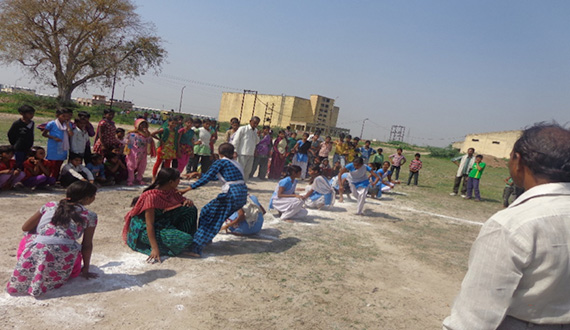
Our Malanpur factory organises sports day for the primary and middle school children at Singwari school
- To empower the SC/ST/PC cadre of society, the unit has been putting continuous efforts in their recruitment process. The Company representatives visit various collages for recruitment. Sustenance allowance is given to PC employees. 14.07% and 1.08% of the unit workforce are from SC and ST category respectively.
- To ensure maximum employment to SC/ST & PC people on contractor’s roll, 40% of contract workers working with us belong to SC/ST category.
- The unit has been making continuous efforts to promote and uplift the education level of SC/ST/PC students. These efforts include providing scholarships to meritorious students of Singwari village who aspire to excel in their studies. 8 SC/ST students & 1 PC student were given scholarships.
- To support and employ differently abled people, we visit Ambedkar Institute for Handicapped, Kanpur every year and employ candidates based on the requirements.
- To explore new avenues to help underprivileged people, we have identified two NGOs who are working for the SC/ST and differently abled children in and around Gwalior. We buy responsible products from these NGOs sustaining their livelihood.
- In order to improve the employability of the people, we partnered with schools, colleges and industries to create awareness on quality concepts, entrepreneurship, environment and safety based on Godrej experience.
- Additionally, we organised an awareness rally on the occasion of Road Safety Week and a sensitisation programme on World No Tobacco Day on May 31. Over 200 Godrejites attended it and pledged to adopt a tobacco-free lifestyle.
Baddi factory:
- In line with our commitment to build a greener India, the unit celebrated World Environment Day at Baddi. A tree plantation drive was organised in two schools in nearby villages. To encourage the students to contribute towards improving the environment, a poster/slogan competition was organised. We carried out a cleanliness drive to sensitise people about the environment. Over 100 Godrejites participated in the drive with support from enthusiastic government officials.
-
A dental health camp was organised for school students. In addition to the regular check-up each student got a free toothbrush and toothpaste, following the camp.
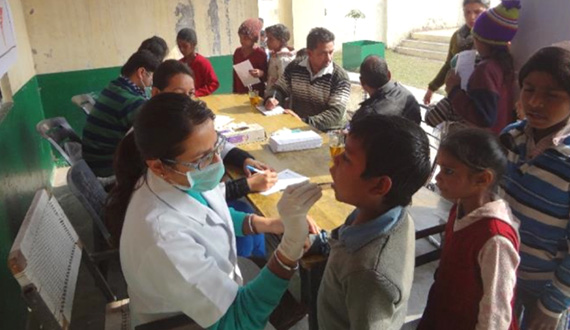
Our Baddi factory organises a dental check-up for the primary and middle school children
- We encouraged Godrejites to participate in a blood donation camp organised by the Rotary Club in Baddi. Over 20 of our team members participated in the camp.
- To encourage academic performance, every year the unit recognises and awards meritorious students at local schools nearby.
- In its continuous effort to help the underprivileged, the units have employed 14.25% its workforce from SC/ST/PC category.
North-East factory cluster:
- We organised an art competition to create awareness on clean and green environment. Over 60 children from North Guwahati, near our unit, participated in the art competition. It was followed by a tree plantation drive by children in the factory premises.
- To encourage academic performance, every year the unit awards the meritorious students. This year the unit supported two meritorious students of a local school by providing books and other study material.
- The cluster organised a handwash awareness camp for students in a local school to sensitise them on health and hygiene.
- As part of a road safety initiative, an awareness campaign was organised in Guwahati to sensitise bikers and car/truck drivers. Around 500 pamphlets with tips on safe driving tools and techniques were distributed at busy traffic points. A street play was also organised to sensitise people on road safety.
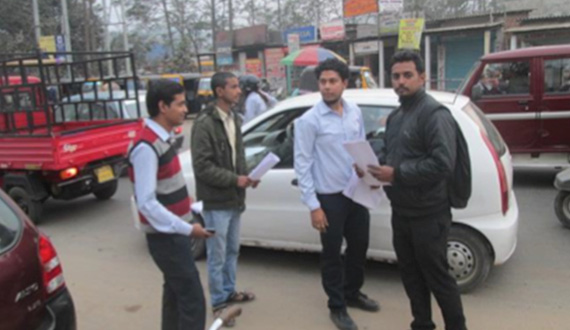
Our North-East factory cluster conducts a road safety awareness campaign
South factory cluster:
- A medical camp was organised for contract workers at Conso unit, Kattukuppam in Pondicherry. Around 150 workers participated and benefitted from this camp. The camp included AIDS awareness and blood testing, eye and dental check-up and general health counselling.
- A hearing and speech medical check-up camp was organised for our team members. Over 120 Godrejites participated in the camp.
- An eye donation awareness programme was organised in association with Aravind Eye Hospital. The programme put together detailed information on eye protection, causes of blindness, controlling blindness and importance of eye donation.
- A prevention of sexual harassment session was organised for adolescent school kids. Around 40 students attended it.
- A Women’s Day celebration was conducted at the unit, supported by the Sub-inspector of Police. As part of the celebration, our women team members played fun team games.
- GCPL Karaikal unit organised a road safety awareness campaign in association with the Karaikal Police in busy traffic junctions.
- The unit with the local Panchayat honoured the freedomfighters of Karaikal region on Republic Day by presenting them a small memento for their contribution.
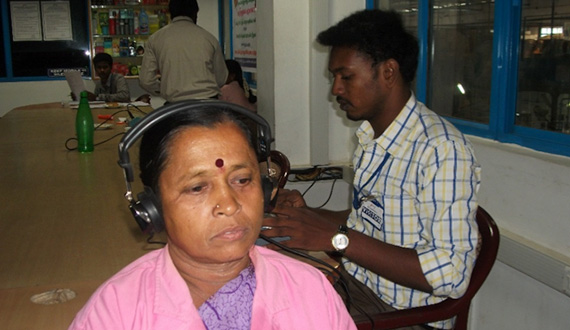
Our Conso unit organises a hearing and speech medical check-up camp
- In line with our greener India commitment we organised an energy, water and fuel saving event at a local school in Karaikal. The students enthusiastically participated in the event.
Has the Company mapped its internal and external stakeholders?
Yes
Out of the above, has the Company identified the disadvantaged, vulnerable and marginalised stakeholders?
Yes
Are there any special initiatives taken by the Company to engage with the disadvantaged, vulnerable and marginalised stakeholders?
Our "Good & Green" vision inspires each one of us at Godrej to continue to work towards building a brighter, greener and more inclusive India. Employee volunteering at our corporate offices and factories forms a crucial element of our Good & Green strategy.
27 employees of GCPL ran the Standard Chartered Mumbai Marathon in January 2015 in support of Teach for India.
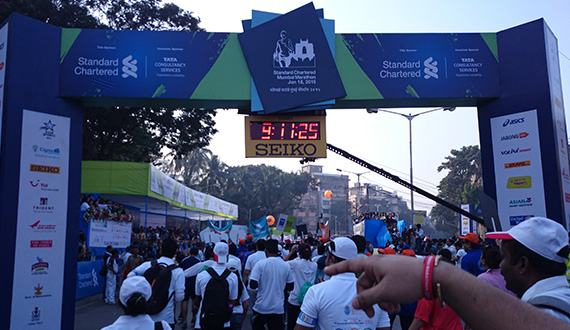
Every year, we participate in the Standard Chartered Mumbai Marathon raising funds in support of Teach for India
Principle 5: Businesses should respect and promote human rights
GCPL respects and promotes human rights for all individuals.
Does the policy of the Company on human rights cover only the Company or extend to the Group/joint ventures/suppliers/contractors/NGOs/others?
The Company has a policy which is applicable to all employees in the Company. For its subsidiaries and joint ventures, the code is applicable in line with the local requirements prevailing in the country of operation. The Company encourages its Business Partners to follow the policy.
How many stakeholder complaints have been received in the past financial year and what per cent was satisfactorily resolved by the management?
Nil
Principle 6: Businesses should respect, protect, and make efforts to restore the environment
Good & Green is driven by the desire to help create a more inclusive and greener India. Launched in 2011 as one of our four key imperatives for 2020, Good & Green is based on shared value, a principle that aligns business competitiveness and growth with social and environmental impact. At its root lies the idea that companies can help solve critical social issues while strengthening their competitive advantage.
Greener India - Achieving zero waste to landfill, carbon neutrality, energy efficiency, positive water balance and a significant usage of renewable energy sources.
Good & Green products – Having a third of our portfolio revenues comprising good and/or green products and services – defined as products that are environmentally superior or addresses a critical social issue (e.g. health, sanitation, disease prevention) for consumers at the bottom of the income pyramid.
Our ‘good’ products are designed to address a critical social issue (e.g. healthcare and sanitation) for consumers at the base of the income pyramid. We define ‘green’ products as those that are environmentally sustainable.
We are continuously striving to achieve the goals and targets set under our good and green initiatives. Our efforts for energy conservation in all our units have resulted in reduction of specific energy and reduction in specific water consumption and Green House Gas (GHG) emissions.
Specific energy consumption of has reduced from 846 kWh/t in 2013-14 to 820 kWh/t in 2014-15. Specific GHG emission during the same period has reduced from 259 kg CO2 e/t during 2013-14 to 249 kg CO2 e/t for the year 2014-15.*
* Till last year, we were using combined margin grid emission factor as a measurement method, but now we have changed to average grid emission factor, which is more appropriate
While specific waste generation has been reduced from 12.1 kg/t during 2013-14 to 11.3 kg/t during 2014-15, waste sent to landfill has also been reduced from 1.28 kg/t in 2013-14 to 1.06 kg/t in 2014-15.
We are also using clean energy sources by shifting from fossil fuels to renewable fuels such as biomass utilisation in boilers and also procuring renewable energy. Renewable energy component has increased from 9% during 2013-14 to 10.3% during 2014-15.

In line with our commitment to building a Greener India, we are making environmental sustainability a key part of our manufacturing process and value chain
All the requirements of the Central Pollution Control Board and State Pollution Control Board have been complied with. Detailed checklists for compliance have been put in place. Continuous thrust is given on improving productivity and plant utilisation to improve specific consumption of water and energy. We have set targets for improvement in our environment performance for both short term as well as long term.
Does the policy related to Principle 6 cover only the Company or extend to the Group/joint ventures/ suppliers/contractors/NGOs/others?
All of our major manufacturing units have policies on environment, health and safety measures. For the subsidiaries and joint ventures, the Code is applicable in line with the local requirements prevailing in the country of operation. The Company encourages its business partners to follow the policy.
A Sustainable Procurement Policy is also under development (draft policy has already been prepared and the approved policy will be in place by the second quarter of FY 2015-16) through which suppliers are recommended to follow best practices in four major categories – ethical, social, environmental and quality.
Does the Company have strategies/initiatives to address global environmental issues such as climate change, global warming, etc? Yes/No. If yes, please give the hyperlink to the webpage.
Greenhouse gas emissions are monitored by all the units and we have taken short term and long term targets for a reduction of the same. Some of the initiatives include utilisation of biomass briquettes in place of coal, procurement of renewable energy, flue gas heat recovery from boiler and utilisation in the process, installation of energy efficient equipments, installation of energy saving lights amongst others.
All our initiatives are covered and updated at www.godrejgoodandgreen.com
Does the Company identify and assess potential environmental risks? Y/N
Yes, potential aspects related to environment are identified and evaluated for their impact on the basis of severity, scale and probability. All the significant aspects have operational control procedure in place.
Does the Company have any project related to Clean Development Mechanism? If so, provide details thereof, in about 50 words or so. Also, if yes, has any environmental compliance report been filed?
No
Has the Company undertaken any other initiatives on clean technology, energy efficiency, renewable energy, etc? Y/N. If yes, please give the hyperlink to the webpage.
We have implemented over 40 initiatives across our manufacturing facilities in India on clean technology, energy efficiency and renewable energy. Some of the major initiatives we undertook during FY 2014-15 are:
- Installation of energy efficient water jet vacuum system in our soap dryers – Four vacuum systems using steam were replaced with energy efficient water jet vacuum systems at our Malanpur soap manufacturing plant. This resulted in steam saving of 60 kg/hour per dryer.
- Installation of oil preheater – An oil preheater was installed in the fat splitting plant to raise the oil temperature from 950C to 1350C. This resulted in reduction of overall thermal energy requirement due to improved atomisation of oil.
- Shifting of oil tanks from Chemical Plant-1 (CP1) to Chemical Plant-3 (CP3) at our soap manufacturing facility – As our CP3 operation yields better and lower energy consumption, the transfer of crude fatty acid stored in storage tanks from CP1 to CP3 resulted in additional steam flushing and pumping activity leading in steam and electricity savings.
- Capacity optimisation of chilling compressor - Enhanced the chiller and condenser to cater brine chilling requirement of two lines from a single compressor.
- Installation of energy efficient blower in soap drier – Existing 2 lube blower was replaced with energy efficient 3 lube blower at our soap manufacturing unit.
- Installation of energy efficient compressors – Reciprocating compressors replaced with variable speed drive screw compressors at two of our manufacturing plants.
- Implementation of heat recovery systems – heat recovery system was installed to capture waste heat from the boiler flue gases and utilise it to heat process water at one of our coil manufacturing plant.
- Replacement of coal with biomass briquettes – Biomass briquettes partially replaced coal in the boiler at one of our coil manufacturing plants.
- Implemented several energy efficient measures across various manufacturing plants, these included, optimisation in steam consumption, installation of energy efficient LED lighting, energy efficient pumps, air conditioning systems, replacing high HP motors with low HP motors, improvements in compressed air system.
- Installation of Reverse Osmosis (RO) systems – RO systems were installed at three of our manufacturing facilities for water treatment.
- Renewable biomass boiler – We have initiated the installation of a 14 tph biomass briquette based boiler at our Malanpur soap manufacturing plant, which is our largest manufacturing facility. The boiler will be operational in FY 2015-16.
Are the Emissions/Waste generated by the Company within the permissible limits given by CPCB/SPCB for the financial year being reported?
Yes. All the units are complying with the norms of CPCB and SPCB.
Number of show cause/legal notices received from CPCB/SPCB which are pending as on end of Financial Year.
Nil
Principle 7: Businesses, when engaged in influencing public and regulatory policy, should do so in a responsible manner
Is your Company a member of any trade and chamber or association? If yes, name only those major ones that your business deals with.
GCPL ensures that its policy is with the highest degree of responsible and ethical behaviour and also works with collective platforms such as trade and industry chambers and associations to raise matters with the relevant government bodies. GCPL is a member of CII, FICCI and other trade associations.
Have you advocated/lobbied through above associations for the advancement or improvement of public good? Y/N. If yes, specify the broad areas (drop box: Governance and Administration, Economic Reforms, Inclusive development policies, Energy Security, Water, Food Security, Sustainable business principle, others).
GCPL has representation through CII and other trade associations for advancement/improvement of public good.
Principle 8: Businesses should support inclusive growth and equitable development
Our "Good & Green" vision inspires each one of us at Godrej to continue to work towards building a brighter, greener and more inclusive India.
Does the Company have specified programmes/ initiatives/projects in pursuit of the policy related to Principle 8? If yes, please provide details thereof.
Yes. A dedicated CSR department termed Good & Green focuses on these projects and initiatives.
Are the programmes/projects undertaken through in- house team/own foundation/external NGO/government structure/any other organisation?
The programme is currently operational in 185 centres across India. An in-house programme of 240 hours has been built to skill the candidates in basic beauty and hair care skills. The training makes use of GCPL products, which are also made available to graduates after the programme at a considerable discount. The curriculum is completely digitised and is available as audio-visual content. Separate modules on enterprise development and employment readiness too have been developed for the beneficiaries of all employability programmes to set them up for success early in their career.
Through our partnerships, we have been able to help 370 women find jobs in recognised parlour chains. Close to 75% of the graduates work as freelancers or micro entrepreneurs using their skills to generate income.

Saloni, our beautician training programme for low income women in India
The school girls’ programme in beauty and wellness is offered in standard 9 as an elective subject. The programme is offered from standard 9 to 12. An after-school programme was also started to enroll students of standard 10.
As Fast Moving Consumer Goods and other similar industries expand in India, a ready pipeline of skilled talent for sales, particularly in rural areas, will be an essential enabler for growth. The industry currently records high attrition of entry-level sales representatives. This can be partly attributed to the lack of requisite skills, leading to an inability to meet targets and manage pressure at work. Godrej Vijay, our training programme in channel sales, was launched in 2011 to help skill unemployed youth and build a talent pipeline for the industry.
The programme has trained 38,999 youth across 44 locations in channel sales. The youth undergo 40 hours of training – half of which is spent in the classroom and the other half as experiential learning. The programme has been specially designed for the purpose of training distributor sales resources. Graduates of the programme may be placed with any of the Godrej companies or even other company distributors in the vicinity of the training. More than 75% of our Vijay graduates have been placed.
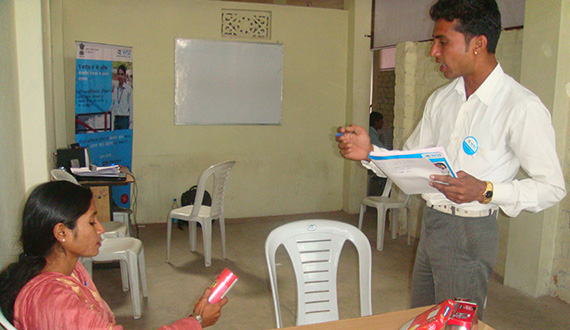
Vijay, our training programme for youth in channel sales aims at bridging the the current talent gap across FMCG and other allied industries
Godrej Sakhi is a programme that trains rural women to become entrepreneurs. These women traditionally advance their family incomes by managing a combination of small farm and non-farm microenterprises (both dependent on the vagaries of seasons and markets). This programme aims to teach rural women – who are either engaged in some form of entrepreneurship or plan to do so – in skills of market opportunity spotting, projecting revenues and earnings, sales & marketing, and time and financial management. About 2,500 women graduated from the programme this year.
Godrej Prerna is our sales training programme in general trade. The programme helps retail shop owners and in-shop associates build skills relevant to General Trade. It aims at equipping the small retailers with skills to compete against the organised retail stores. The one for in-shop retail associates involves training in stock and shelf management. It helps them know their products and understand the growth drivers of the business. The other, for training shop owners, helps them understand the drivers of their business, how to efficiently manage stock and interact with customers. It also covers general trends in retail and self-service stores. This year about 3,000 people graduated from the programme.
Have you done any impact assessment of your initiative?
Yes. We did a mid-term programme evaluation for two of our programmes – Sakhi and Saloni.
What is your Company’s direct contribution to community development projects?
In the year, the Company spent 0.8% of PAT on CSR initiatives.
Principle 9: Businesses should engage with and provide value to their customers in a responsible manner
We are a customer centric Company and greatly value the trust, satisfaction and loyalty of our customers across the world. Our primary focus is on delighting our customers, both external and internal. Customer centricity is part of Godrej Group’s Code of Conduct. We strive to ensure that customer needs are satisfied and that our products and services offer value to the customer.
Our customer focus does not only extend to external customers alone, but includes internal customers as well. We firmly believe that external customer satisfaction can be attained only if internal customers’ needs and reasonable expectations are met and our employees are strongly encouraged to act in accordance with this principle.
What percentage of customer complaints/consumer cases are pending as on the end of financial year?
Nil
Does the Company display product information on the product label, over and above what is mandated as per local laws? Yes/No/NA/Remarks (additional information).
GCPL displays adequate information to enable safe and effective usage of its products.
Is there any case filed by any stakeholder against the Company regarding unfair trade practices, irresponsible advertising and/or anti-competitive behaviour during the last five years and pending as on end of financial year? If so, provide details thereof, in about 50 words or so.
None
Did your Company carry out any consumer survey/ consumer satisfaction trends?
Yes